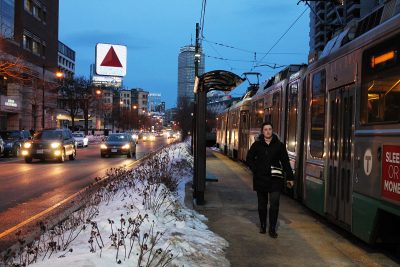
Around the world, cities are growing, and Boston is no exception. “The Future of Transportation, a Boston View,” a conference hosted by the Mass Technology Leadership Council on Thursday, invited members of the tech community, business leaders, entrepreneurs and academics alike to contemplate what the future of transportation looks like for a growing city, according to its event page.
“This is a really interesting time in Boston and it’s an interesting time in the development of a lot of new technologies,” said Tom Hopcroft, president and CEO of MassTLC. “So by bringing people together from the technology community, some early entrepreneurial folks along with larger companies, along with policy makers and academics … you know, to address the future of mobility, you really need to bring all these different parts together.”
John Moavenzadeh, officer and senior director at the World Economic Forum, talked about the origins of transportation challenges that cities across the world face in the conference’s keynote address, “Global Trends in Urban Mobility.” He also talked about possible solutions and steps that communities are taking to address the challenges.
Both urbanization and economic growth, Moavenzadeh said, lead to increased mobility demand in urban environments, which in turn augments their traffic, air pollution and transportation-related fatalities.
Additionally, factors such as climate change and decreased interest in car ownership have created pressure to decrease carbon use and increase the availability and transportation services, respectively, Moavenzadeh said.
“If you look at the demographic trends, you can see that, over the last 20 years or so, populations have been moving towards cities, and we see that increasing,” Hopcroft said. “And so, as you get more people moving around within a city or within an urban or metropolitan area, the challenges of everything from getting people from place to place to parking to pollution … all of these issues come into play.”
In his presentation “Smart City and Transportation Status in Boston,” Nigel Jacob, co-founder of New Urban Mechanics, explained how the Go Boston 2030 initiative has engaged with the Boston community since its launch.
The initiative was launched in September 2015 and has been led by Mayor Martin Walsh, his advisory committee and a collaboration of governmental departments, according to Go Boston 2030’s website.
“From the outset, the intention was to create a process by which we can be speaking deeply with the community,” said Jacob during his talk, “And, in many ways, have the conversation led by the community.
And Bostonians have responded. Currently, Go Boston 2030’s website includes 3,700 project and policy ideas submitted to the initiative.
Isha Srivastava, a first-year graduate student at Northeastern University, laments her poor commuting options. Presently, she said she can either spend $2.75 and more than an hour of her life riding the T to her internship or she can pay $30 for a half-hour Lyft ride.
“I am a student, so obviously I wouldn’t want to spend so much money because I have limited resources,” she said. “And I would definitely want to spend it in different areas rather than just transportation … I would have preferred a much better connected public transportation system or more loyalty programs for students.”
Some of the conference’s other programming, including a panel on autonomous vehicles and demonstrations of said technology, explored how autonomous technology will be integrated into society.
“We feel that it almost makes sense to have a kind of petting zoo for autonomous vehicles, so that the members of the public can come and look and see and touch and get to understand what the capabilities are of these vehicles,” Moavenzadeh said.
On March 7, after 18 months of collaboration between the city and the World Economic Forum, Go Boston 2030 will release a vision and action plan, laying out how Boston’s transportation landscape will be reshaped, potentially in ways that could help people like Srivastava and many others.
“Our focus … is not on the guy driving the Tesla,” Moavenzadeh said. “It’s actually on the single mom who needs to be able to get to work.”




